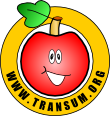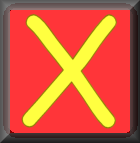
 |
Rounding to the nearest whole numberPractise your approximation and rounding skills with this online, self-marking exercise. |
This is level 1; Rounding numbers to the nearest whole number. You can earn a trophy if you get at least 9 correct.
This is 'Rounding to the nearest whole number'. You can also try rounding to:
1 decimal place
2 decimal places
1 sig fig
2 sig figs
3 sig figs
Ten, hundred etc
InstructionsTry your best to answer the questions above. Type your answers into the boxes provided leaving no spaces. As you work through the exercise regularly click the "check" button. If you have any wrong answers, do your best to do corrections but if there is anything you don't understand, please ask your teacher for help. When you have got all of the questions correct you may want to print out this page and paste it into your exercise book. If you keep your work in an ePortfolio you could take a screen shot of your answers and paste that into your Maths file. |
||
|
|
||
|
|

|
More Activities: |
|
Mathematicians are not the people who find Maths easy; they are the people who enjoy how mystifying, puzzling and hard it is. Are you a mathematician? Comment recorded on the 17 June 'Starter of the Day' page by Mr Hall, Light Hall School, Solihull: "Dear Transum, Comment recorded on the 28 May 'Starter of the Day' page by L Smith, Colwyn Bay: "An absolutely brilliant resource. Only recently been discovered but is used daily with all my classes. It is particularly useful when things can be saved for further use. Thank you!" |
Each month a newsletter is published containing details of the new additions to the Transum website and a new puzzle of the month. The newsletter is then duplicated as a podcast which is available on the major delivery networks. You can listen to the podcast while you are commuting, exercising or relaxing. Transum breaking news is available on Twitter @Transum and if that's not enough there is also a Transum Facebook page. |
|
AnswersThere are answers to this exercise but they are available in this space to teachers, tutors and parents who have logged in to their Transum subscription on this computer. A Transum subscription unlocks the answers to the online exercises, quizzes and puzzles. It also provides the teacher with access to quality external links on each of the Transum Topic pages and the facility to add to the collection themselves. Subscribers can manage class lists, lesson plans and assessment data in the Class Admin application and have access to reports of the Transum Trophies earned by class members. If you would like to enjoy ad-free access to the thousands of Transum resources, receive our monthly newsletter, unlock the printable worksheets and see our Maths Lesson Finishers then sign up for a subscription now: Subscribe |
||
Go MathsLearning and understanding Mathematics, at every level, requires learner engagement. Mathematics is not a spectator sport. Sometimes traditional teaching fails to actively involve students. One way to address the problem is through the use of interactive activities and this web site provides many of those. The Go Maths page is an alphabetical list of free activities designed for students in Secondary/High school. Maths MapAre you looking for something specific? An exercise to supplement the topic you are studying at school at the moment perhaps. Navigate using our Maths Map to find exercises, puzzles and Maths lesson starters grouped by topic. | ||
Teachers | ||
|
If you found this activity useful don't forget to record it in your scheme of work or learning management system. The short URL, ready to be copied and pasted, is as follows: |
Alternatively, if you use Google Classroom, all you have to do is click on the green icon below in order to add this activity to one of your classes. |
It may be worth remembering that if Transum.org should go offline for whatever reason, there is a mirror site at Transum.info that contains most of the resources that are available here on Transum.org. When planning to use technology in your lesson always have a plan B! |
|
|
||
Close

Level 1 - Rounding numbers to the nearest whole number
Level 2 - Rounding numbers to one decimal place
Level 3 - Rounding numbers to two decimal places
Level 4 - Rounding numbers to one significant figure
Level 5 - Rounding numbers to two significant figures
Level 6 - Rounding numbers to three significant figures
Level 7 - Rounding numbers to the nearest ten, hundred etc
More on this topic including lesson Starters, visual aids, investigations and self-marking exercises.
Answers to this exercise are available lower down this page when you are logged in to your Transum account. If you don’t yet have a Transum subscription one can be very quickly set up if you are a teacher, tutor or parent.
See the National Curriculum page for links to related online activities and resources.
Don't wait until you have finished the exercise before you click on the 'Check' button. Click it often as you work through the questions to see if you are answering them correctly. You can double-click the 'Check' button to make it float at the bottom of your screen.
Answers to this exercise are available lower down this page when you are logged in to your Transum account. If you don’t yet have a Transum subscription one can be very quickly set up if you are a teacher, tutor or parent.
The significance of trailing zeros in a number not containing a decimal point can be ambiguous. For example, it may not always be clear if the number 1300 is precise to the nearest unit (just happens coincidentally to be an exact multiple of a hundred) or if it is only shown to the nearest hundreds due to rounding or uncertainty. The following widely recognised options are available for indicating the significance of number with trailing zeros:
For the purpose of answering the questions in the higher level exercises these methods are not necessary as your typed answers appear on the same page as the instructions stating the number of significant figures required.
Close

QI,
Monday, February 28, 2022
"Who was the first person to put two feet on the top of Everest?
It was Radhanath Sikdar who had a special aptitude for trigonometry. Back in the 1850s he used a theodolite located 150 miles away to measure the height as being exactly 29,000 feet. He thought people would not be impressed with the accuracy of his measurement as it was a multiple of a thousand so he added two feet to make the measurement 29,002 feet. Thus he became the first person to put two feet on the top of Everest!
Quite Interesting!"
Lauri Johnson, Eastern Hancock High School
Monday, August 14, 2023
"Some of the questions for 3 sigfigs require the student to write the answer so that it only has 2 sigfigs. For example, 87954 to 3 sigfigs is 8.80 x 10^4, but the practice wants the answer to be 88000. But that answer only has 2 sigfigs. Only a few questions come up like this, but I wanted to pass is along. Other than that, this is a GREAT practice for my chem students. Thanks for making this available.
[Transum: Thanks very much Lauri, that's an excellent point. I have added information to the Help tab to explain the situation with examples of how to avoid ambiguity.]"
Grange Academy Mathematics Department Newsletter, Scotland
Saturday, January 24, 2026
"I saw a wee clip of kids in a primary classroom practising rounding numbers.
https://tinyurl.com/RoundingWithBalloons
The idea of using a helium balloon seemed like a nice visual reminder. When deciding if the 3 will stay the same or round up, the person holding the balloon grips the string with all five fingers, releasing as they count…
So, the first finger goes as they count 1, the second finger goes as they count 2, the third finger goes as they count 3, the fourth finger goes as they count 4 and as soon as they count 5 or higher, the balloon rises to the ceiling indicating that we round up!
Two subtle points here. I like that the balloon stays the same or goes up. That’s probably more helpful than saying that the 3 digit rounds up or rounds down (although I realise that in terms of the original number there’s a sense in which that’s true). Also, in the original clip the pupils show a connection between the digit being rounded and the balloon digit which determines whether we round up or stay the same. That could be useful when rounding to a certain number of significant figures too!
Thanks to Aylesham Primary School for inspiring this post about rounding."